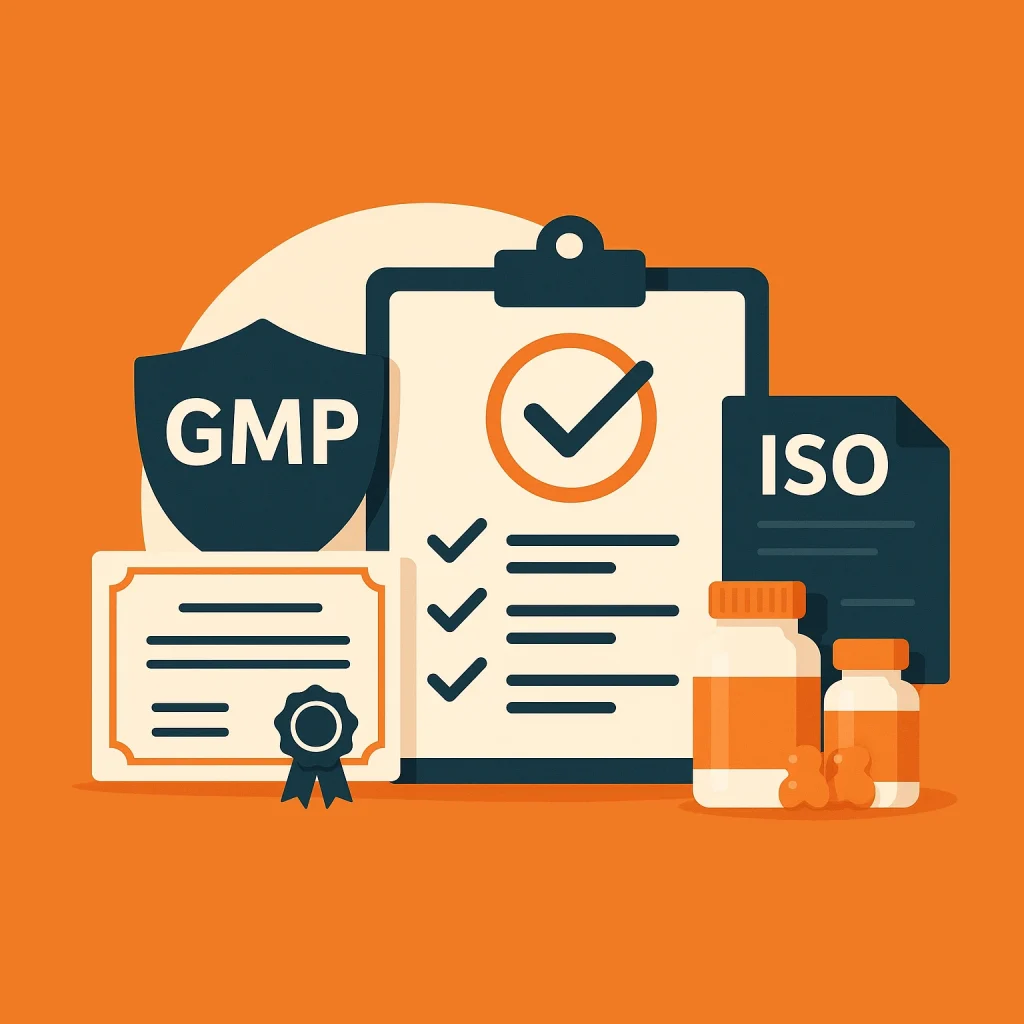The dietary supplements and health products market has become one of the fastest-growing industries worldwide over the past decade. People are becoming increasingly health-conscious, and as life expectancy rises, the desire for a higher quality of life comes to the forefront. Today’s health philosophy is not just about treating illness but preventing it before it begins. Vitamins, probiotics, collagen supplements, and herbal products have now become a part of daily routines.
However, this rapid growth has also brought with it a greater need for attention, quality, and trust. Consumers are no longer just reading the ingredient label; they are asking: “Which factory produced this product? What certifications does the facility hold? Does it comply with international standards?” Retailers and distributors, in turn, open their doors only to brands that manufacture under certified conditions.
This is where GMP and ISO certifications come into play. These documents are not just pieces of paper; they are the keys to trust, professionalism, and sustainable growth for brands.
What is GMP (Good Manufacturing Practices)?
GMP, or Good Manufacturing Practices, are international standards established to ensure that products directly related to human health are manufactured safely, hygienically, and with high quality. In dietary supplement production, GMP is considered the “gold standard.”
Many entrepreneurs ask: “Does GMP only mean hygiene?” In reality, GMP is much more than that:
- Raw material control: Every vitamin, mineral, or botanical ingredient that goes into the product must undergo laboratory testing. Low-quality or contaminated raw materials are eliminated before production even begins.
- Trained personnel: Everyone involved in production must be trained to specific standards.
- Hygiene conditions: Production areas, uniforms, and equipment are governed by strict rules.
- Documentation system: Every step of the production process is recorded, ensuring full traceability.
- Storage and logistics: Even details such as storage temperature and humidity levels are monitored to preserve product shelf life.
The greatest advantage GMP provides to entrepreneurs is credibility. For consumers, the GMP logo signals: “This product was produced under safe conditions.” In the U.S. and European markets, working with a manufacturer that does not have GMP certification is virtually impossible.
The Importance of ISO Certifications
ISO, the International Organization for Standardization, defines globally recognized quality standards. In the dietary supplements industry, the most critical ones are:
ISO 9001 – Quality Management System
ISO 9001 focuses not only on the production line but on the entire company’s operations. From customer relations to supplier management, it systematizes quality at every stage.
Benefits for entrepreneurs:
- Ensures consistency across products.
- Makes collaboration with retail chains easier.
- Provides institutional credibility for investors.
- Professionalizes brand image.
For example, if an entrepreneur launches a gummy brand in Turkey, working with an ISO 9001-certified manufacturer becomes a huge advantage when placing products in pharmacies or chain stores.
ISO 22000 – Food Safety Management System
ISO 22000 is designed to reduce food safety risks to zero. Based on HACCP principles, it doesn’t just check if the product is safe at the end, but analyzes all potential risks throughout the production process.
Benefits for entrepreneurs:
- Essential for exports.
- Builds additional consumer trust through food safety.
- Ensures products pass through customs without issues.
For instance, a Turkish brand aiming to export gummies to Germany would have virtually no chance without ISO 22000 certification.
Why Are These Certifications Critical?
For any entrepreneur, the most valuable asset is brand trust. Without GMP and ISO certifications, an entrepreneur:
- Cannot enter chain stores. Retailers will not stock uncertified products.
- Cannot export. Certifications are mandatory at customs in Europe, the U.S., and the Middle East.
- Loses consumer trust. On social media, the perception of being “uncertified” can destroy a brand quickly.
- Faces legal risks. Products may be recalled during inspections, leading to severe financial penalties.
In contrast, certified production:
- Builds consumer trust.
- Adds professionalism to the brand.
- Opens doors for exports.
- Attracts investors and distributors.
Tangible Opportunities Certifications Offer Entrepreneurs
- Pharmacy and Retail Channels
GMP and ISO certifications are prerequisites for placing products on pharmacy shelves. In Turkey, pharmacists refuse to sell products without seeing certified production documents. This makes certified production a critical advantage for expanding sales channels.
- Online Platforms
E-commerce platforms require safety certifications for product listings. Amazon, in particular, will not approve dietary supplements without GMP and ISO certifications in the U.S. and European markets.
- Global Market Expansion
For entrepreneurs who want to go beyond the local market, certified production is a must. For example, exporting products to Dubai or Saudi Arabia is only possible with GMP and ISO certifications.
- Investors and Business Partners
For entrepreneurs seeking funding, certifications are the strongest assurance for investors: “This brand manufactures under certified conditions and has minimized its risks.”
Real-World Examples
- U.S. Market: In the U.S., where gummy vitamins have exploded in popularity, no product can be sold in major retail chains without GMP and FDA compliance. Even small entrepreneurs immediately seek contract manufacturers with GMP certification.
- European Market: In countries like Germany and France, consumers demand “clean label” products. This not only refers to clean ingredients but also to certified production processes. Entering this market without ISO 22000 is impossible.
- Middle Eastern Market: While Halal certification is important, GMP and ISO certifications are also required to pass customs smoothly. In Saudi Arabia, the Ministry of Health insists on seeing manufacturing certifications for all imported supplements.
The Cost of Producing Without Certifications
Some entrepreneurs attempt to cut costs by producing without certifications. However, this mistake can destroy a brand in the long run. For example, a vitamin brand in Turkey that produced uncertified products managed to strike a deal with a retail chain, only to fail inspections later. The products were pulled from shelves, causing not only financial losses but also irreparable damage to the brand’s reputation.
In contrast, a certified brand was able to expand beyond Turkey, launching its products on Amazon Germany and increasing its revenue fivefold.
Conclusion: Certifications Are Not Just Paper – They Are the Key to Growth
GMP and ISO certifications are not just legal requirements for entrepreneurs; they are guarantees of growth, trust, and sustainable success. With these certifications:
- Products become reliable.
- Consumer and retailer trust is secured.
- Export opportunities open up.
- Brand reputation is strengthened.
If you are planning to launch your own brand, our GMP- and ISO-certified manufacturing infrastructure can help you bring your products to market quickly, enabling you to achieve success both locally and globally.






